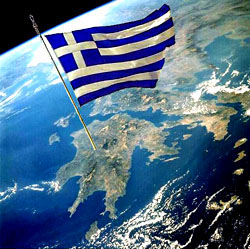 After receiving €110 billion in bailout money two years ago, Greece received another €130 million today. Before it was approved, however, the eurozone finance ministers received a confidential report with some grim news. The Financial Times got hold of a copy:
After receiving €110 billion in bailout money two years ago, Greece received another €130 million today. Before it was approved, however, the eurozone finance ministers received a confidential report with some grim news. The Financial Times got hold of a copy:
The 10-page debt sustainability analysis, distributed to eurozone officials last week but obtained by the Financial Times on Monday night, found that even under the most optimistic scenario, the austerity measures being imposed on Athens risk a recession so deep that Greece will not be able to climb out of the debt hole over the course of a new three-year, €170bn bail-out.
It warned that two of the new bail-out’s main principles might be self-defeating. Forcing austerity on Greece could cause debt levels to rise by severely weakening the economy while its €200bn debt restructuring could prevent Greece from ever returning to the financial markets by scaring off future private investors.
….The report made clear why the fight over the new Greek bail-out has been so intense. A German-led group of creditor countries — including the Netherlands and Finland — has expressed extreme reluctance to go through with the deal since they received the report.
It’s not clear to me why this report changed anyone’s attitude toward Greece. Of course the austerity measures being imposed on Greece are going to send them into an even more wrenching recession. And of course no one in their right mind is going to loan money to Greece for many, many years to come. This can’t possibly have come as a surprise to anyone, could it?
If Europe wants Greece to survive as part of the eurozone, its member countries are probably going to have to commit to a nearly open-ended flow of fiscal transfers, just as California is implicitly committed to an open-ended flow of fiscal transfers to Mississippi:
A “tailored downside scenario” in the report suggests…Greece would need about €245bn in bail-out aid, far more than the €170bn under the “baseline” projections eurozone ministers were using in all-night negotiations in Brussels on Monday….Even under a more favourable scenario, Greece could need an additional €50bn by the end of the decade on top of the €136bn in new funds until 2014 being debated by finance ministers on Monday night.
I’m willing to bet that even these scenarios are unduly rosy. A more realistic analysis would probably produce even grimmer news, but that’s the price of a fixed-exchange-rate area. If the eurozone’s rich countries aren’t willing to sign up for this, they probably should have just cut the cord now and thrown Greece to the wolves.
UPDATE: Felix Salmon is blunter than I am: even the “tailored downside,” he says, “still looks astonishingly optimistic.” His whole piece is worth a read. It explains the deal in pretty lucid terms.













